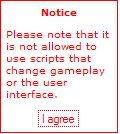-
Wed 27th Jan 2010 02:24 #1 / 17
Hugh has some very interesting analysis of how long it takes to achieve ratings equilibrium. He will be along shortly I'm sure.
Cramchakle wrote: [anything]
I agree
-
Wed 27th Jan 2010 02:51 #2 / 17
Analysis is easy for me. I haven't won a game yet and never will, so mine reached equilibrium when I joined.

-
 Wed 27th Jan 2010 02:54 #3 / 17
Wed 27th Jan 2010 02:54 #3 / 17
False. Anyway, like me (or so I tell myself), you contribute to the community in less traditional ways.
Cramchakle wrote: [anything]
I agree
-
 Thu 28th Jan 2010 00:35 #4 / 17
Thu 28th Jan 2010 00:35 #4 / 17
Not so shortly - busy day - but now the relaxing recreational math portion can begin

-
 Thu 28th Jan 2010 01:19 #5 / 17
Thu 28th Jan 2010 01:19 #5 / 17
Equilibrium itself is a good place to start. For any board you've played, there is an average rating of your opponents. A good simplifying assumption is that this average will not change much, so in our calculations we pretend we play only players of that rating. While higher quality data (avg rating of best player in game, avg of 2nd best etc) can be kept to calculate an even more accurate equilibrium, this should be accurate enough.
Next we fix a game size (# of players) and estimate the probability that you win such a game. You can base the probability estimation on your record or on some sort of best/worst case scenario numbers you have in mind.
Symbolically, we let A = Average opponent rating; C = your current rating; p = probability of you winning, and n = number of players in the game.
Your expected change (E) for a single game is given by:
E = p*[20*(n-1)*(A/C)] - (1-p)*[20*(C/A)]
You have reached equilibrium when E = 0. Solving for C (using no more than simple algebra), we get find that we have reached equilibrium when
C = sqrt(A^2*(n-1)*p/(1-p)) = A*sqrt((n-1)*p/(1-p))
In the next post, I'll give some sample calculations before moving on to estimating equilibrium time.
For those unfamiliar, probabilities are always numbers between 0 and 1 inclusive. The expected value calculation may be unfamiliar to some, so I'll expand a bit: It measures what you expect from a given probability situation. If p is the probability of success, 1-p the probability of failure, R is the reward for success, P the penalty for failure, then expected value is calculated as E=p*R - (1-p)*P. The above formula for E uses this sites rating updating function.
-
 Thu 28th Jan 2010 01:29 #6 / 17
Thu 28th Jan 2010 01:29 #6 / 17
The type of calculation you might do is this: You feel like a badass on a recently created board, so you estimate you'll win 40% of your 5-player games against an average opponent rating of 1050. The formula from last post is that your equilibrium rating is
A*sqrt((n-1)*p/(1-p))
where n is the number of players, A is the average opponent rating, and p is your probability of winning.
So, for this situation, you need to calculate
1050*sqrt(4*.4/.6), which is 1715.
Using Kobra Kai style numbers on a dueling map (80% or more if I recall correctly), a similar calculation reveals that 1050*sqrt(1*.8/.2) = 2100 would have been his equilibrium rating on many boards.
-
 Thu 28th Jan 2010 01:34 #7 / 17
Thu 28th Jan 2010 01:34 #7 / 17
Not to jump into the middle of Hugh's posts, but what is the purpose of this or intended outcome? That's in an I'm completely lost tone, not an I'm trying to be a jerk tone. Perhaps I don't understand what rating equilibrium means or what it could potentially mean. If this will be answered or I'm just way to out of the loop then feel free to say shhhh and ignore me :).
What's Your Passion? A cure? Three simple molecules? Building for the small? Compassion for children?
Seek Yours Today. Get Uncomfortable.
-
 Thu 28th Jan 2010 02:10 #8 / 17
Thu 28th Jan 2010 02:10 #8 / 17
Still constructing the main post, but I think this is a good question, so I address it immediately.
So, you (especially you Yertle) may have noticed how you start out increasing your rating quickly, but once it gets higher, it's like swimming in molasses to get it even higher still. Nonetheless, it keeps going up. At some point, your rate of winning is not enough to get it to increase in any noticeable way. Chance makes it so you win some, you lose some, so your rating bobs and weaves, but you have a certain win rate that keeps it in the general vicinity of a number. That number is your equilibrium rating.
It's a nice number to keep in mind - are your goals for your rating realistic - can you catch Dud on Global Warfare? To find out, estimate some probabilities and calculate your equilibrium rating.
The next aim is to address the question of how long it takes to get there. I think this is information one might be curious about no matter what rating system you are using. So, one ultimate aim is to satisfy that curiosity. I have other motives as well, which I will expand upon eventually.
-
 Thu 28th Jan 2010 10:02 #9 / 17
Thu 28th Jan 2010 10:02 #9 / 17
Thanks, kinda gotchya now :)!
What's Your Passion? A cure? Three simple molecules? Building for the small? Compassion for children?
Seek Yours Today. Get Uncomfortable.
-
 Thu 28th Jan 2010 15:27 #10 / 17
Thu 28th Jan 2010 15:27 #10 / 17
Okay, here goes: The numbers I'm using are from the win rates of actual players here on the site (no names of course). I wrote a simulator (57 lines of Java, releasable upon request) that simulates a player's rating as they win or lose games (win or loss being determined randomly according to win rate). A single run produces a number, but the program runs 10000 simulations and averages the results. There is little variation in the averages, so I consider the numbers as "correct enough". There is a lot of variation from run to run though.
-
 Thu 28th Jan 2010 15:38 #11 / 17
Thu 28th Jan 2010 15:38 #11 / 17
Also, for simplicity, I assume the opponents' average rating to be around 1100 - on new maps it will be closer to 1000, but on popular maps, it is often over 1100.
-
 Thu 28th Jan 2010 15:54 #12 / 17
Thu 28th Jan 2010 15:54 #12 / 17
4 player games are the most popular. Here is a chart of results:
Win rate # of games to equilibrium Equilibrium Rating
.52 122 games 1983
.46 99 games 1758
.35 66 games 1398
.31 51 games 1277
5 player games are also popular.
Win Rate # of games to Equilibrium Equilibrium Rating
.5 120 games 2200
.36 76 games 1650
.31 51 games 1337
Duels aren't here yet in full force, but in the future we'll see more.
So... 2 player games:
Win Rate # of games to Equilibrium Equilibrium Rating
.71 209 games 1721
.65 156 games 1499
.56 94 games 1240
What does this all mean?Edited Thu 28th Jan 15:57 [history]
-
 Thu 28th Jan 2010 16:12 #13 / 17
Thu 28th Jan 2010 16:12 #13 / 17
Going back to the Yertle question, perhaps a slogan for equilibrium rating is that it is your "true rating". Maybe you are overachieving, underachieving, or haven't played enough games on a map - eventually you will hover around your equilibrium rating.
The main observation is that most players here or on the other site never achieve their true rating on a board. It takes too long to do so.
I have other thoughts, simple suggestions, and the like, but I'll stop here and ask (to the 2 people actually reading the thread!) if this makes sense or if there is more data or explanations needed.
-
 Thu 28th Jan 2010 16:49 #14 / 17
Thu 28th Jan 2010 16:49 #14 / 17
I think I'm still following you :P... but...
What does this all mean?
What's Your Passion? A cure? Three simple molecules? Building for the small? Compassion for children?
Seek Yours Today. Get Uncomfortable.
-
 Thu 28th Jan 2010 17:52 #15 / 17
Thu 28th Jan 2010 17:52 #15 / 17
I have a question.
I assume the opponents' average rating to be around 1100 - on new maps it will be closer to 1000, but on popular maps, it is often over 1100
Can you explain this further? The fact that the average rating would be that much higher than 1000 when ratings are zero-sum seems strange. I would guess it's due to a certain kind of selection bias for semi-talented players playing more games on a given map than players that suck? Is there anything I've missed or does that account for the whole effect?
Yertle, I think you're looking too deep. I don't know that there is any big-time point to be made... mostly it's fun with numbers. This information is interesting on its own merits without leading to any earth-shattering conclusions.
I do think it's neat that Hugh has basically proven that any one player's rating on any one board is more of a "best guess" (or even potentially more random than that) than it is a true reflection of their skill. What I find even more interesting is that the better you are, the longer it takes to get to an expression of your true talent level.
Numerically-inclined baseball fans will find much of this familiar - the adage that three seasons' worth of defensive data is roughly equivalent in terms of predictive value to one season's worth of offensive data and so forth.Cramchakle wrote: [anything]
I agree
-
 Thu 28th Jan 2010 21:30 #16 / 17
Thu 28th Jan 2010 21:30 #16 / 17
asm wrote: I have a question.
I assume the opponents' average rating to be around 1100 - on new maps it will be closer to 1000, but on popular maps, it is often over 1100
Can you explain this further? The fact that the average rating would be that much higher than 1000 when ratings are zero-sum seems strange. I would guess it's due to a certain kind of selection bias for semi-talented players playing more games on a given map than players that suck? Is there anything I've missed or does that account for the whole effect?That was based on a small sample of games I've played, so it may not have been the best number to use. I also ran the simulator on 1000 and 1050 average opponents and got similar numbers. The global rating average must be 1000, but those who play only a little probably have a lower win percentage than those who play a lot, causing us to see larger than 1000 ratings on average. On WF, some players would just play a map once and disappear, causing the pool of active players to be higher rated.
Thanks for the sports numbers analogy - that really is a large part of the fascination. As communicator of the stats themselves, I just like seeing the numbers and thinking about them and sharing them. There is also this other side of me that wants to call in to the sports radio station to give my opinion on them (ie I will get around to answering Yertle!)
-
 Thu 28th Jan 2010 21:51 #17 / 17
Thu 28th Jan 2010 21:51 #17 / 17
Continuation of last post - against 1000 averaged players, a win rate of 52% in 4-player games yields a rating of 1803, achieved on average in 105 games. The numbers for 1100 rated were a rating of 1983, achieved in 122 games.








